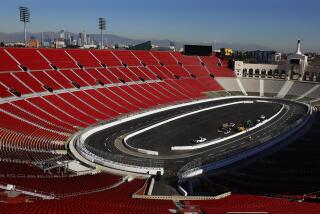Mazda Hangs Its Badge on Laguna Seca Track
- Share via
Mazda North American Operations--importer of the Miata sports car--has acquired title sponsorship of California’s famed Laguna Seca raceway as part of its quest to establish an identity in the United States as a performance-car company.
Terms of the five-year pact were not disclosed, but insiders say it cost Mazda in the neighborhood of $10 million.
The 44-year-old track--now known as Mazda Raceway at Laguna Seca--is at the base of the Monterey Peninsula and is home to a number of widely viewed automotive events, including the annual Monterey Historic Races.
Mazda will be able to use the track for corporate events, including new-vehicle introductions and dealer meetings.
There are no plans on the boards for any Mazda-sponsored race events, although insiders say that could change.
Laguna Seca also is home base for the annual Honda Grand Prix of Monterey and the Honda International Superbike Classic motorcycle races--a situation that could see rival Mazda sometimes getting a free plug each time Honda Motor Co. promotes one of the eponymous race series.
A spokesman for Torrance-based American Honda Motor Co. said executives are looking into the situation, but it is “too early to say” whether Honda will continue its race sponsorships at a Mazda-themed Laguna Seca or move to other events at other tracks.
Honda, which has been the biggest corporate sponsor at the track for years and whose cars and motorcycles are touted on the track’s Web site as the official vehicles of Laguna Seca, was offered the title sponsorship last year but declined.
John Stornetta, the track’s general manager, said Honda was the first company approached when Laguna Seca officials began shopping for a financial benefactor early last year. Mazda, which had no affiliation with the track, was offered the deal in November.
Mazda North American officials said they signed the deal with the Sports Car Racing Assn. of the Monterey Peninsula, operator of the twisting, 2.2-mile track, to further demonstrate the Irvine-based auto company’s commitment to performance cars and driving.
In addition to the sporty and often-raced Miata roadster, Mazda has introduced a souped-up version of its entry-level Protege sedan, aimed at the typically young street-performance market, and is about to reintroduce its high-performance rotary engine in a rakish sports sedan called the RX-8. Mazda’s previous rotary-engine car was the RX-7.
After stumbling for several years in the U.S. with a cloudy image as it tried to sell everything from commuter cars to sports cars to luxury sedans, Mazda this year has focused on reestablishing itself as a maker of performance-oriented vehicles.
Its new advertising campaign uses the phrase “zoom-zoom” and boasts that all Mazda vehicles share the Miata’s sports-car DNA.
Although it has become common for corporations to pay huge fees to sponsor public venues--Staples Inc., for instance, paid $116 million for the right to hang its name on Staples Center in Los Angeles--Mazda is the first auto company to sponsor a major raceway.
“We were looking for a spiritual home” in the U.S., said Charlie Hughes, president of Mazda North American. “Now we have one.”
Stornetta said Mazda’s sponsorship fees will “allow us to embark on a capital improvement plan that will make us one of the finest racing facilities in the world.”






